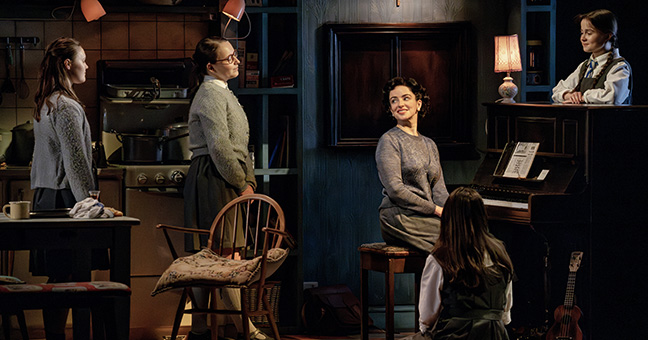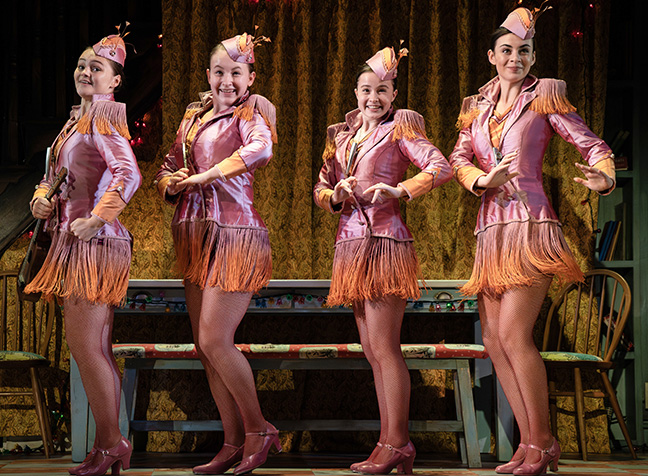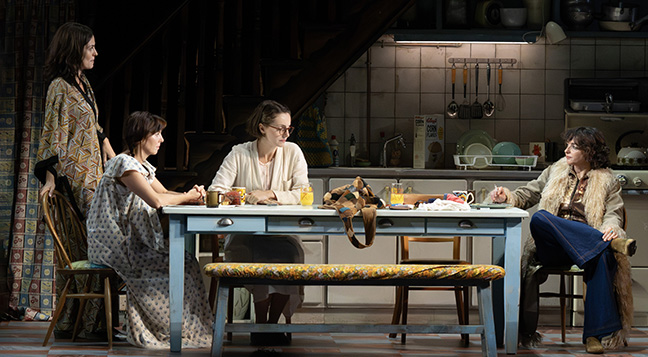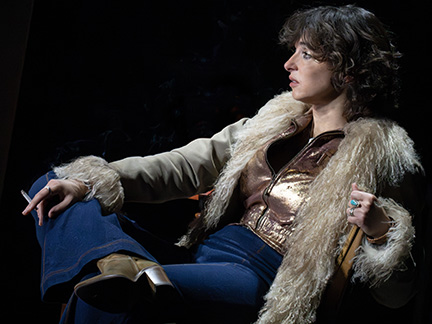By Lucy Komisar
The hills of California in Jez Butterworth’s engrossing feminist play are not real but mirages in a story of working-class dreams and desperation. It’s 1955, and Veronica (Laura Donnelly) is consumed with making her four young girls a worldclass music success. Like many a Mama Rose, her chief goal appears to be liberation from her own life, which is a running a Blackpool B&B called “Seaview,” from which you can’t see the sea. I say “feminist” not because I think he claims that but because it is about the destruction of women by the patriarchy of the time.
Before shifting into flashbacks, the story starts in 1976. Veronica is upstairs dying of cancer. We never see her in this era. Mr. Potts (Richard Lumsden), as he did in 1955, comes to tune the piano, which remains as an ironic reminder of the family’s dreams.
Butterworth has written this so you don’t see a continuing timeline, but present ambiguities that are unraveled in shifts to the past.
Three of the daughters are at the B&B kitchen ruminating about their lives. Gloria (Leanne Best) remembers the dark side of the later years, about a mother who went to bingo games to drink and was found in the street in her underwear: “Mum drinks three bottles of sherry and dances up street in her frillies.”
Expecting Joan, the sister who went to California, Gloria says you see a stretch limo or helicopter. She is withering in her hostility toward the one they think “made it.”

(Note, the accents are thick, sometimes hard to understand, made worse by a bad sound system.)
After a half hour, flashback, the cute girls are singing “The Hills of California.” Then they do the Andrews Sisters, “Rum and Coca Cola.” Veronica demands rent from a roomer, comic Jack Larkin (Bryan Dick), who puts her off, saying he can fix up a showbiz connection.
Donnelly is daunting as Vernonica, who changes personalities like a snake its skin. She can be a charmer, but also controlling, aggressive, officious. She lies, screams, is monstrous when she loses control. She tells a variety of stories of how her soldier husband lost his life in the War.
Back to the present, Gloria and Ruby (Ophelia Lovibond) are each married but not content with their lot. Jill (Helena Wilson) never married, cared for their mother (she calls it her “sacrifice”), now keeping her alive till Joan comes. Her only hidden pleasure is to secretly smoke. They are all unhappy in their own ways.

Back to the past, Jack brings Luther St. John (David Wilson Barnes) an American agent who touts Perry Como as a client. She set the girls to do a nice jazzy “Bugle Boy,” more Andrews Sisters.
This style music is not what the public wants today, he says. “Have you heard of Elvis Presley?” He doesn’t see star quality in them except in Joan (Lara McDonnell), 15. But the sound isn’t good in their kitchen. Isn’t there another place she can audition? Joan leads him to one of the bedrooms. You guess the rest.
Joan ends up in California, where she cuts one album. Now, (played by Donnelly in a curious flip side of her mother), she has returned two decades later at 35, worldly, laid back, chewing gum, in a shaggy-edged sheepskin coat, gold jacket, jeans, boots, definitely California.
The gum tells you what you need to know about her status. Definitely not limo. She starts to go upstairs to see her mother but freezes, reliving how she came down those stairs 20 years before. When Veronica gambled her daughter for the big chance and lost her daughter and her life.

Sam Mendes’ taut direction means this story never even gets close to melodrama or soap opera, but is marked by a straight-forward tension that smartly cuts anything maudlin from the surprises.
By the way, this is so real, please remember it is fiction!
“The Hills of California.” Written by Jez Butterworth, directed by Sam Mendes. Broadhurst Theatre, 235 West 44th Street, NYC. Runtime 2hrs45min Opened Sept 29, 2024, closes Dec 22, 2024.




An engaging and fascinating play, I found it – as the author pointed out – hard to understand because of thick accents and bad acoustics. Otherwise the play kept you on your toes.
Nice.
And nice to see you here, too.